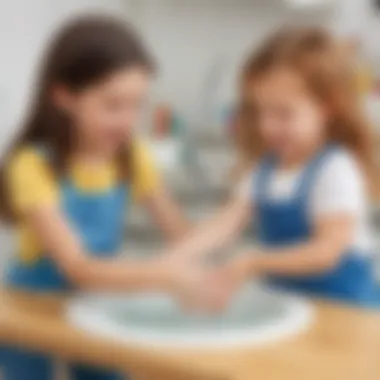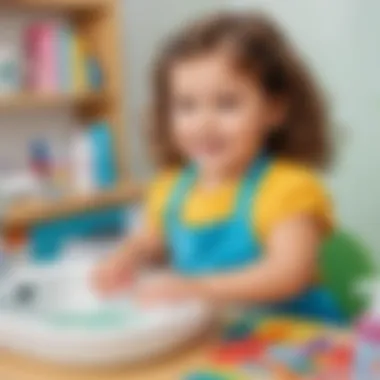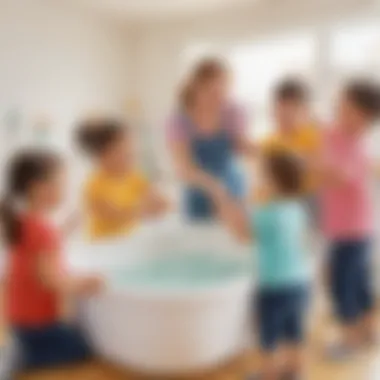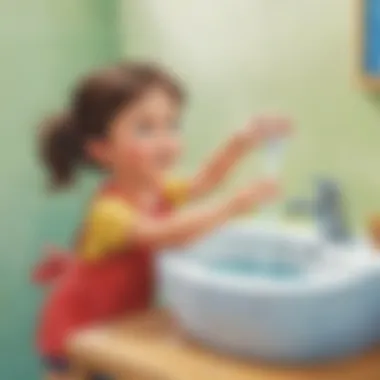Hand Washing Activities for Preschoolers: Fun & Engaging


Intro
Hand washing is essential for good health, particularly for preschoolers. Teaching young children about hygiene lays the groundwork for lifelong habits. It is important that this learning is engaging and interactive. Activities designed for preschoolers can transform a simple task like hand washing into a fun and educational experience.
Through various activities, we can ensure children understand the reasons behind washing their hands, such as preventing illness and keeping germs at bay. This article presents a variety of creative methods and practices to promote hand washing among preschoolers. The focus is on techniques that educators and parents can employ to instill these vital hygiene habits with enthusiasm and joy.
Fun Activities Ideas
Creating engaging activities helps preschoolers learn the basics of hand washing while having fun. Here are some diverse approaches to encourage active participation and enjoyment in this important practice.
Indoor Activities
- Silly Soap Songs
Sing songs about hand washing. Songs can make the process memorable. Encourage kids to create their own lyrics to popular tunes. - Germ Counting
Use glitter or paint to represent germs. Let children draw their hands in washable markers, then use a wet cloth to show how hand washing removes germs. - Hand Washing Chart
Create a chart that shows steps to wash hands thoroughly. Encourage children to mark off each step when they wash.
Outdoor Adventures
- Nature Hunt
After a nature hunt, discuss why it is essential to wash hands. Provide a portable washing station, if possible, and let kids practice. - Gardening Time
Gardening can be messy. Teach children the importance of washing hands before a snack or after playing in the dirt.
Arts and Crafts
- Germ Jar Craft
Use a clear jar filled with water and glitter to symbolize germs. Have children shake it and see how it represents germs spreading. Discuss how washing hands clears them away. - Hand Print Art
Have children make hand prints with washable colors. Afterward, let them wash their hands while discussing the importance of cleanliness.
Science Experiments
- Soap and Water Experiment
Provide different types of soap. Let children test which soap works best by timing how long it stays sudsy while rubbing hands together. - Germ Test
Use bread to show how germs spread. Place bread in different environments and later discuss how hand washing can prevent this.
Cooking and Baking
- Recipe Preparations
Involve children in cooking activities. Before starting, emphasize how washing hands is a must. Let them practice as part of preparing snacks. - Hand Hygiene Reports
Write down simple recipes together. Allow kids to read and practice the steps, emphasizing the need for clean hands before eating.
"Teaching hygiene practices at an early age promotes lifelong habits, ensuring children grow up understanding the importance of health and safety."
The activities outlined here present diverse ways for preschoolers to engage with hand washing. They not only learn theory but also practice in fun environments.
Importance of Hand Washing
Teaching preschoolers about hand washing is essential for their overall health and well-being. Understanding how and when to wash their hands can significantly influence children’s hygiene habits as they grow, helping to lay a strong foundation for a healthy lifestyle. Activities that encourage hand washing bring several benefits that need to be emphasized to both educators and parents.
Health Benefits
Hand washing reduces the spread of germs and harmful bacteria. Research shows that proper hand washing can cut the risk of respiratory infections by about 20%. When children wash their hands regularly, they have lower chances of experiencing common illnesses such as colds and flu.
Some key health benefits include:
- Lower rates of infection in children.
- Reduced absenteeism in schools due to illness.
- Greater knowledge of personal hygiene that extends to other areas of health.
By engaging children in fun activities related to hand washing, they become more aware of the importance of clean hands, thus promoting better health outcomes.
Building Good Habits
Developing good habits at a young age is crucial in shaping future behavior. By establishing hand washing as a routine, children learn to associate it with cleanliness and safety. This practice should be introduced as soon as children can understand simple instructions and perform basic motor skills.
To foster these good habits, consider these approaches:
- Modeling Behavior: Adults need to demonstrate proper hand washing techniques regularly. This modeling sets an example for children to follow.
- Routine Integration: Embed hand washing into daily activities, such as before meals or after outdoor play, to make it a natural part of their day.
Preventing Illness
One of the most significant outcomes of teaching hand washing is the prevention of illness. A simple act of washing hands can prevent the transmission of infections. Children often play closely together, sharing toys and space, which makes it easier for germs to spread.


Key points on preventing illness include:
- Utilizing soap and water effectively to eliminate germs; emphasize scrubbing for at least 20 seconds.
- Incorporating hand washing in school or daycare procedures to ensure that it becomes a normalized practice.
Hand washing not only helps reduce the incidence of diseases but also equips preschoolers with lifelong skills that contribute to their health and that of those around them.
Understanding Preschool Education
Understanding the landscape of preschool education is crucial when addressing hand washing activities for young children. Preschool serves as a foundational stage in a child's life. This phase is not only about basic academics but also about cultivating essential life skills. Among these, hygiene practices, particularly hand washing, play a pivotal role in promoting overall health among preschoolers.
Incorporating hand washing lessons within preschool education enhances children's learning experiences. It provides them with practical knowledge that they can apply daily. Activities designed around this topic contribute to their cognitive and social development. Furthermore, engaging preschoolers in discussing health and hygiene can lead them to become more conscious of their actions.
Developmental Milestones
At preschool age, children typically develop specific skills that align with their age and learning capabilities. Understanding these milestones is fundamental for teachers and parents. For instance, most preschoolers start recognizing the benefits of hygiene around ages three to five. At this stage, they can comprehend simple concepts of germs and the importance of cleanliness.
Hand washing activities can be tied into these milestones. For example, discussing how germs spread during circle time can be beneficial. Visual aids may facilitate their understanding of the invisible nature of germs. It encourages children to engage more actively in wiping their hands and asking questions about hygiene.
Educational activities can include role-playing scenarios where kids pretend to wash their hands after imaginary play. This informal learning reinforces their understanding of health habits while aligning with their developmental needs.
Role of Play in Learning
Play is integral to preschool education. It is through play that young children explore their world and learn effectively. Incorporating hand washing activities into play enhances the learning experience. Children often learn best when they do not realize they are learning.
Examples of playful learning could include games that require washing hands before participating. For instance, a song about washing hands could be sung before lunchtime. This approach helps children associate hand washing with positive feelings and fun.
Moreover, incorporating puppet shows where puppets talk about the importance of hand washing can captivate children's interest. The playful interaction often leads to a retention of knowledge. They are more likely to remember the hand washing routine because of the enjoyable experience associated with it.
In summary, understanding preschool education and integrating hand washing activities is essential for promoting lifelong hygiene habits. Recognizing children’s developmental milestones and spearheading learning through play ensures that lessons resonate well, making them both informative and enjoyable. Early interventions in this aspect can lead to healthier habits that extend beyond preschool.
Creative Hand Washing Activities
Creative hand washing activities play a significant role in making hygiene education appealing to preschoolers. By integrating fun and engaging methodologies, educators can effectively teach children the importance of cleanliness in a manner that resonates with their curious and imaginative nature. The benefits of these activities extend beyond mere hand washing; they cultivate an understanding of health practices and foster critical thinking skills through interactive learning environments. When activities are enjoyable, children are more likely to remember and replicate these habits.
Storytelling Approach
Storytelling is a powerful tool for conveying messages and values, particularly to young children. The use of stories about characters who wash their hands can create relatable contexts that capture their attention. For example, one could narrate a tale about a mischievous germ that causes mischief when children forget to wash their hands. By guiding children through the story and showcasing how characters overcome this germ by washing their hands, educators can create memorable lessons about hygiene.
Characters can be drawn from familiar cultures or children's literature, enhancing the connection children feel to the activity. If these stories include clear, repeated instructions on hand washing techniques, they reinforce good practices while maintaining engagement.
Rhyming Songs and Chants
The use of rhymes and songs can make hand washing an enjoyable routine. Preschoolers respond well to rhythmic patterns and melodic tunes, making them ideal for teaching essential steps in hygiene practices. For example, a simple chant that lists the steps of hand washing while the children sing along can effectively guide them through the process.
Here’s an example:
"Wash, wash, wash your hands, Keep them clean and bright, Rinse and scrub, make it fun, Do it morning, noon, and night!"
Using repetition helps solidify the process in their minds. Additionally, integrating movements to match the lyrics can enhance physical engagement, further embedding these actions into their memory.
Art and Craft Integration
Art and craft activities can also enhance children's understanding of hand washing. By creating visual representations of germs and clean hands, educators can stimulate discussion about hygiene and its importance. For instance, children can use craft materials to design their own hand washing posters illustrating the steps they have learned.
This hands-on approach allows them to express their understanding creatively. They may also create puppets depicting germs and healthy hands, engaging their imagination while learning. Displaying their artwork in common areas reminds everyone of the importance of hand hygiene in a fun and encouraging manner.
Engaging children with art prompts discussions about cleanliness and creativity. The overlap of education and creativity fosters a holistic approach to learning, making the concept of hand washing both informative and enjoyable.
Structured Hand Washing Sessions
Structured hand washing sessions play a crucial role in teaching preschoolers about hygiene. These sessions are designed to provide a systematic approach to hand washing that children can easily understand and follow. The importance of having a structured routine lies in its ability to reinforce the habit of washing hands regularly, which is essential in preventing the spread of germs and illness. By ensuring these sessions are engaging and interactive, children can better grasp the significance of cleanliness in their daily lives.


Demonstration Technique
One effective way to teach young children proper hand washing techniques is through demonstration. When educators or parents model the hand washing process, it gives children a clear visual guide. This technique allows children to observe each step closely—from wetting the hands, applying soap, scrubbing for at least twenty seconds, to rinsing and drying their hands. Demonstrations should be simplified and engaging, turning the routine into a fun practice.
The effectiveness of this approach comes from the children’s inclination to mimic adult behavior. They learn better when they see and participate actively. After the demonstration, taking time to let children practice can further reinforce these skills. Regularly repeating this process helps solidify the habit over time.
Using Visual Aids
Visual aids are another excellent tool in structured hand washing sessions. Pictures, charts, or even animated videos can capture children's attention and convey the steps involved in hand washing. For example, a colorful poster with illustrations of each stage of the hand washing process can serve as a handy reference point for preschoolers. This can be displayed in restrooms or classrooms where children can see it often.
Visual aids not only enhance understanding but also make the learning environment more vibrant and enjoyable. They cater to various learning styles, particularly for visual learners. Adding an interactive element, such as stickers or magnets for when they complete each step, can create excitement around hand washing. This connection to visual cues ensures that the lesson sticks better in their memory.
Peer-to-Peer Learning
Lastly, peer-to-peer learning is a valuable method within structured sessions. Children often feel motivated when they can learn alongside their friends. Organizing group activities where kids wash hands together promotes collaboration and community learning. For instance, using a buddy system where one child instructs another can reinforce their understanding while boosting confidence.
Encouraging discussion during these sessions can allow children to share what they have learned with one another. This not only deepens their understanding but also reinforces the idea that hand washing is a shared responsibility within their community. Peer support can make the practice less daunting and more fun for young learners.
"Engaging preschoolers in hand washing through structured sessions enhances their grasp of hygiene and creates lasting habits."
Incorporating Technology
In today's world, technology plays an essential part in education. Children are increasingly exposed to digital tools from a young age. Therefore, when teaching hand washing activities, it is crucial to integrate technology. This approach captures the attention of preschoolers and enhances their learning experience. Using technology, educators can create a more engaging and interactive environment. Here are some elements to consider when incorporating technology in teaching hand washing:
- Engagement: Technology can make lessons more interesting. It can include videos, apps, and games that visually stimulate children.
- Relevance: Children often relate better to technology. Using devices familiar to them supports their learning process.
- Accessibility: Many educational tools are available online. This allows for easy accessibility by both teachers and parents.
However, it is crucial to ensure that technology is used appropriately. Balancing screen time with hands-on activities maintains the effectiveness of learning while fostering healthy habits.
"Integrating technology in preschool education encourages children to learn and adopt hygiene practices in enjoyable ways."
Educational Videos
Educational videos serve as a powerful tool for teaching preschoolers about hygiene practices, including hand washing. These videos often feature colorful graphics, engaging characters, and catchy tunes. This combination makes complex topics simpler and easier to understand.
- Understanding visual learning: Preschoolers are primarily visual learners. Educational videos cater to this by providing clear visual instructions on proper hand washing techniques.
- Repetition and reinforcement: Through repeated viewing, children can reinforce their understanding of the process. The more they see the content, the more likely they are to remember it.
- Variety of content: Many platforms offer diverse videos that cater to different learning needs. This variety means educators can select videos that resonate with their specific audience.
Both parents and teachers can use platforms such as YouTube or educational websites that create content specifically for children. This flexibility makes it easier to present hand washing in fun and memorable ways.
Interactive Apps
Interactive apps provide another excellent avenue for teaching preschoolers about hand washing. These applications often include games and quizzes that engage children while imparting important lessons on hygiene.
- Hands-on learning: Many apps encourage children to participate actively. They can practice what they learn in a simulated environment, which helps them develop proper habits.
- Immediate feedback: Interactive apps offer children immediate feedback on their progress. This feedback can motivate them to improve and master hand washing techniques.
- Parental involvement: Some apps include features that encourage parents to participate in their child's learning. This collaboration reinforces the importance of hand hygiene at home and school.
Collaborative Activities with Parents
Involving parents in hand washing education is crucial. Their participation not only reinforces what children learn in preschool but also strengthens the message that hygiene is an integral part of daily life. When parents engage in collaborative activities, they create a unified approach to teaching their children about hand washing. This collaboration can enhance understanding and retention of hygiene practices. Children often mirror the behaviors of adults, so seeing parents actively participate in these activities makes a significant impact.
Workshops and Demonstrations
Hosting workshops and demonstrations for parents can be a highly effective way to teach hygiene practices. These events provide valuable, hands-on experiences for both parents and their children. In workshops, parents can learn about the importance of hand washing and its health benefits. Demonstrating proper techniques can help parents reinforce these lessons at home.
During a workshop, educators can showcase engaging methods. One useful approach is to have parents and children practice together, using playful elements. The use of songs and stories can make the learning process enjoyable. Parents can see firsthand how their child reacts to different teaching methods, which empowers them to carry these techniques into daily routines at home. Here, parents gain practical tips for monitoring their children's hand washing habits, ensuring that they develop and maintain proper hygiene.
Resource Sharing
Sharing resources between educators and parents is vital for ongoing education. Educators can provide flyers, brochures, or links to online material about effective hand washing techniques. These resources can offer tips on how to integrate hygiene lessons into everyday activities. Educators might also share fun hand washing apps or educational videos that parents can use at home.
Additionally, setting up a resource library allows parents to borrow materials and explore additional activities. This initiative promotes continuous engagement and reminds families about the importance of hygiene. Parents can also share their own experiences and methods, creating a circle of learning.
Parents play an essential role in reinforcing hygiene practices at home, leading to better long-term results.


Ultimately, collaboration between parents and educators creates a comprehensive learning environment. Parents staying informed and engaged helps children internalize good hygiene habits. As families work together, they strengthen the commitment to hand washing as a daily practice. In this way, the foundation for a healthier future is built.
Evaluating Effectiveness
Evaluating the effectiveness of hand washing activities for preschoolers is crucial for several reasons. First, it helps educators and parents understand whether the methods employed truly resonate with the children. If the activities are not engaging or informative, the primary goal of instilling good hygiene habits may not be achieved. Therefore, continuous assessment enables adjustments to be made, optimizing the experience for both children and adults.
Second, understanding effectiveness aids in tracking the development of hygiene practices among preschoolers. When parents and teachers assess what works, they can measure improvements in children's behaviors over time. This can lead to more insights on how to enhance engagement further.
Finally, evaluating these activities also benefits future educational efforts. Sharing these evaluations with other educators can help create a substantial body of knowledge, allowing preschool programs to model effective practices.
Observational Assessment
Observational assessment plays a vital role in evaluating hand washing activities. It involves watching and noting how children respond during these sessions. Educators should look for several factors:
- Engagement Level: Are the children actively participating?
- Technique: Are they following the hand washing steps accurately?
- Understanding: Can they articulate the importance of hand washing?
Recording these observations allows instructors to identify patterns. For instance, if most children struggle with the timing or technique, it may signal a need to revisit those specific areas. Additionally, feedback from observation can be used to adapt future sessions to ensure they are more effective. Over time, this assessment helps build a clearer picture of how well the concepts are being grasped.
Feedback Mechanisms
Incorporating feedback mechanisms is equally important for evaluating hand washing activities. It involves gathering input from both children and parents. This can be done through:
- Surveys: Simple questionnaires can gauge both children’s enthusiasm and learning retention.
- Parent Meetings: Discussing children's behavior at home can provide insights into how the lessons translate outside of the classroom.
- Direct Conversations: Engaging with the children post-activity can yield valuable information about their understanding and perceptions.
Feedback serves to highlight areas for improvement and celebrates successful initiatives. It is through these channels that educators can refine their approaches, ensuring that the hand washing activities remain impactful and beneficial. Therefore, both observational assessments and feedback mechanisms are essential components in establishing and maintaining effective hygiene education in preschool settings.
Potential Challenges and Solutions
Teaching preschoolers to wash their hands effectively is crucial for instilling lifelong hygiene habits. However, educators and parents often face challenges in implementing these lessons. Understanding the obstacles and formulating solutions can significantly enhance the learning process. The following subsections outline two main challenges and propose actionable strategies to address them.
Resistance to New Habits
Resistance to new habits is a common challenge. Young children might resist changing their established routines. They may find hand washing tedious or unnecessary. This resistance can stem from various factors including previous experiences, lack of understanding, or simply the natural inclination to resist change. To mitigate this resistance, educators can utilize engaging methods that capture the children’s attention.
Here are some effective strategies:
- Incorporate Fun Activities: Use games or songs related to hand washing to make the process enjoyable.
- Positive Reinforcement: Reward children for participating in hand washing with praise or small incentives, encouraging them to embrace these habits.
- Role Modeling: Demonstrating proper hand washing in a playful manner can help children learn by example. When children see adults enjoying the process, they are more likely to mimic those behaviors.
By acknowledging and addressing this resistance, we can create an environment conducive to developing good hygiene habits.
Time Constraints in Classrooms
Time constraints in classrooms present another significant hurdle. Preschool educators often juggle multiple activities within limited time frames, making it challenging to dedicate adequate time to hand washing lessons. Despite the importance of hygiene, the reality of an educator's schedule can shift focus away from these essential practices.
Possible solutions include:
- Integrating Hand Washing into Other Activities: Combine hand washing with other routine tasks within the classroom, such as before snack time, ensuring children wash their hands regularly without disrupting the daily schedule.
- Efficient Technique Demonstration: Educators can teach children a quick and effective hand washing technique. Emphasizing the steps while keeping the duration brief can help meet time constraints without sacrificing the educational components.
- Utilizing Visual Aids: Placing visual reminders near sinks, such as posters illustrating proper hand washing techniques, can encourage children to remember and practice these skills independently and efficiently.
By navigating the time constraints, it is possible to integrate essential hygiene practices into preschool routines successfully.
Epilogue and Future Directions
In the context of preschool education, enhancing hand washing practices is not just an important task, but a foundational element for promoting lifelong hygiene habits. As demonstrated throughout this article, engaging preschoolers in fun and interactive hand washing activities can significantly improve their understanding of health and safety. This effort is critical in setting the stage for a future where these young learners naturally incorporate hygiene practices into their daily routines.
Reinforcing Hygiene Practices
Reinforcement of hygiene practices can be achieved through consistent messaging and activities. It is essential that both teachers and parents collaborate to create an environment where hand washing is a priority. This consistency can be accomplished by:
- Creating a Structured Routine: Establish daily or weekly schedules for hand washing, incorporating these moments into the preschoolers' existing routines.
- Using Positive Reinforcement: Rewarding children for proper hygiene practices can encourage them to continue these behaviors. Simple rewards can include stickers or praise during activities.
- Modeling Behavior: Adults should model proper hand washing techniques. Children learn a lot from observation and are likely to imitate adults they respect.
Adapting to New Insights
Societal knowledge about health has evolved. Thus, it is critical to adapt hand washing education as new insights emerge. This proactive approach includes:
- Staying Informed on Health Guidelines: Educators should regularly review updated health guidelines from reputable health organizations. This ensures that the information they deliver is current and relevant.
- Incorporating Feedback: Listening to observations from parents and children can provide different perspectives on the effectiveness of hand washing activities. This feedback loop can reveal what works best for different groups of children.
- Integrating New Technologies: Utilizing apps and educational videos that depict effective hand washing can appeal to tech-savvy young learners. This method allows for a modern approach tailored to today’s education environment.
By staying committed to reinforcing hygiene practices and being adaptable to new insights, we can ensure that preschoolers not only learn the importance of hand washing but also carry these essential habits into their future. The ultimate goal is to foster an environment where hygiene becomes an integral part of their lives.



